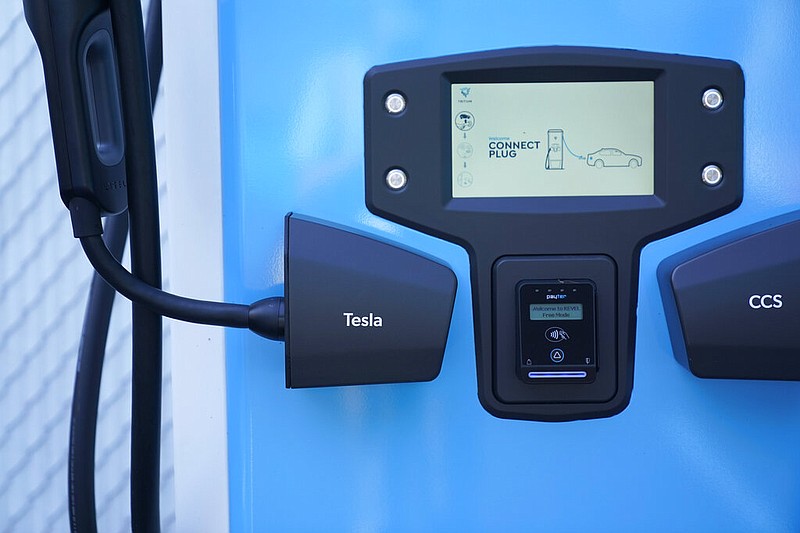The Arkansas Department of Transportation and the Arkansas Department of Energy and Environment are working on a plan to put electric vehicle charging stations about every 50 miles along Arkansas' interstates.
The plan is Arkansas' part of the National Electric Vehicle Infrastructure Plan and Arkansas is expected to receive $54 million. The charging stations would be within one mile of an interstate and include four, high-speed chargers each.
The National Electric Vehicle Infrastructure Formula Program is a $5 billion effort to establish a national network of 500,000 electric vehicle charging stations by 2030 along highways federally designated as alternative fuel corridors. The program will provide money to state governments over the next five years for electric vehicle infrastructure and increase access to charging stations for drivers making longer trips.
The state's plan mapping where stations are needed is expected to be submitted to the Federal Highway Administration in September.
"Initially our focus is on the current designated alternative fuel corridors and the designated interstates: Interstate 40, Interstate 30 and Interstate 49," said Brad McCaleb, with the Arkansas Department of Transportation.
"Once we have been certified as built-out for those corridors, then we'll be able to expand the program. I'm not exactly sure how we'll approach that, but, at some point, we'll include in the calls for applications other routes than the interstate highways."
PAYING THE BILLS
The department is preparing a state-specific EV Infrastructure plan to determine how the state will administer the federal money available to build the facilities, McCaleb said. The Transportation Department wants the charging stations to be built by public or private entities, or a combination.
The department doesn't plan to own, operate or have any public stations on department property, McCaleb said.
There's also expected to be $2.5 billion available in federal competitive grant programs and the state will help with the grant application process and coordination of projects.
The state will have to build the charging systems along the interstates to Federal Highway Administration standards before looking at other roads around the state, McCaleb said. Areas off the interstates may use slower, but cheaper, levels of charging, at least initially.
The state plans to work with utility companies to make sure there's enough electric capacity to operate charging stations in rural areas, McCaleb said.
Andrew Conley, with the Transportation Department, said the cost for four fast chargers is expected to be about $600,000. Adding amenities for people to use at the stations will likely push that cost closer to $1 million per station. Arkansas would like to see more than 50 charging sites built. Sites will need to be accessible by the public 24/7.
Conley said there will eventually also be money available for other entities will be able to apply for building charging stations.
"There'll be opportunities for cities and towns and planning organizations to make their own applications and go after their own funding for their projects," he said.
Conley said the state will be happy to coordinate with those entities wanting to participate to avoid duplication of work.
GETTING A CHARGE
An electric vehicle charging station connects an electric vehicle to a source of electricity to recharge the vehicle's batteries, according to TechTarget, a website which explains technologies. Some charging stations have advanced features such as cellular capability and network connectivity, while others are more basic. Stations provide special connectors that conform to a variety of electric vehicles.
Charging stations are sometimes provided in municipal parking lots by electric utility companies or at retail shopping centers by private companies.
Fees for using chargers can vary from monthly or yearly flat rates to per-kilowatt to hourly rates. Charging stations can also be free when subsidized by local governments, according to TechTarget.
Different types of chargers provide different speeds of charging.
• Level 1 charging stations use a 120 volt, alternating-current plug and require a dedicated circuit, offering about five miles of range for every hour of charging.
• Level 2 stations charge through a 240 volt, alternating-current plug and require home charging or public charging equipment to be installed. Level 2 stations provide 10 to 20 miles of range for every hour of charging. Level 2 chargers are the most common and charge at about the same rate as a home system.
• Level 3 chargers, also known as DC Fast Chargers, use a 480 volt, direct-current plug. They bypass the onboard charger and provide electricity to the battery via a special charging port. DC Fast Chargers provide up to 40 miles of range for every 10 minutes of charging, but are not compatible with all vehicles. Some propriety charging stations, such as the Tesla Supercharger, are designed for significantly higher-speed charging.
Arkansas currently has 171 publicly available charging station locations; 417 Level 2 charging station ports; 72 DC Power Fast Charging station ports; and, five National Electric Vehicle Infrastructure compliant charging station locations, according to the Transportation Department.

